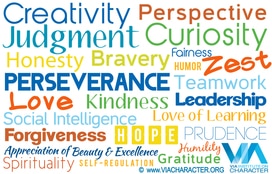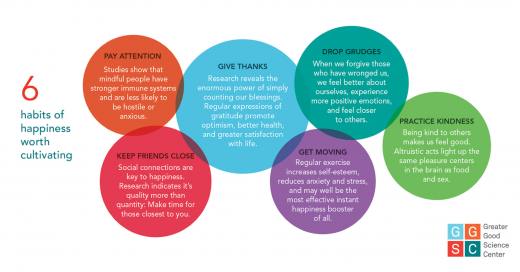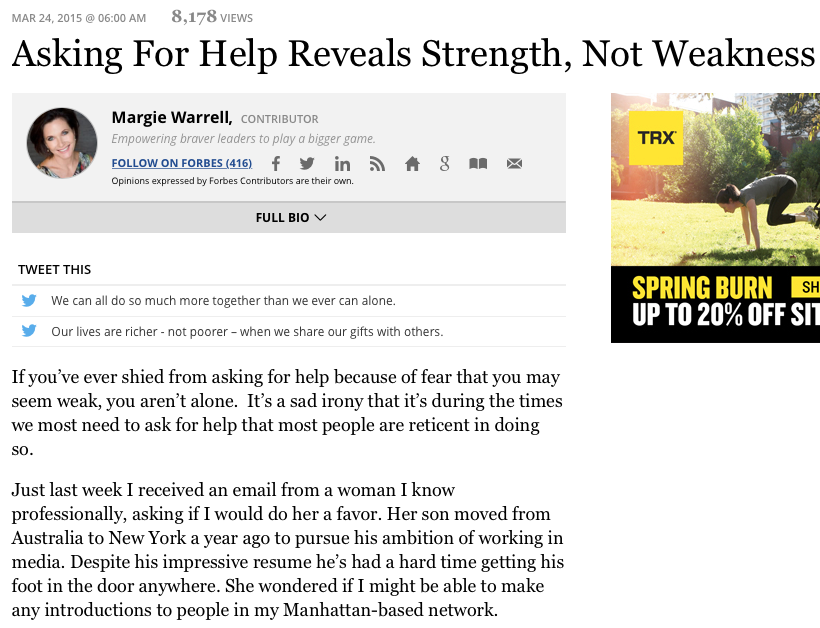|
“The opposite of patience is aggression—the desire to jump and move, to push against our lives, to try to fill up space.” ― Pema Chödrön, The Pocket Pema Chodron "Uncertainty is a great blessing, if you can flow with it. If you're stuck on your determination… on your outcome… then uncertainty doesn't have a chance and miracles can’t happen” –Jonas Gerard (artist)  Have you ever felt like you should know what you want next, but you don’t? Maybe you don’t like where you’ve been, but don’t know yet where you want to go? Can you think of a time when you felt a great need to have the answers and they wouldn’t come? “In between” times happen when one identity has fallen away, but a new one hasn’t emerged. Examples of this are retirement, relationship loss, and sickness. But it also happens when you no longer feel a good fit with what you have been doing or who you have been, and don’t yet know where you want to go.  The gap between where you’ve been, and where you’re going is incredibly uncomfortable and often quite scary because you’re leaving your old comfort zone behind and don’t yet have new ground to stand on, new answers, or new identities. It’s common to want to choose something fast, make a plan, take action. Plans and action helps us feel like we’re on solid ground, they help us feel safe. But don’t be fooled, the “In between times” are full of possibility, they are rich and they are worth spending some time in. Imagine a caterpillar hanging in its cocoon: a time of great internal transformation happens before it emerges as a butterfly. When you are “in between”, you no longer have the option of what you used to be doing or who you used to be (i.e. employed, in love, knowing what’s next), but you're also not limited by those things either. If you can acknowledge that the old is gone, “in between” times can be a time of great change and self-discovery.  When clarity doesn’t come right away, being willing to sit in the discomfort you feel and cultivating patience and kindness for yourself is important. I know, you want practical things to do as well. So here’s a list:
 Building these skills can help you gain the strength you need until answers come. If you are in an “in between” time and would like some support, simply hit reply to set up a free consultation. I love helping people find what they need. Have a great October, Jen
0 Comments
“Happiness is not something ready made. It comes from your own actions.” - Dalai Lama XIV I’m back to thinking about happiness… Especially when I look at the political and economic climate in the U.S. right now. Everyone wants to be happy – our family, our friends, our neighbors, our political adversaries. We have this in common. But how many of us have looked at what makes us happy beyond things (like new phones) and experiences (like vacations)? Coaching is all about setting and achieving goals. Have you asked yourself what is driving your goals lately? Is it your values? Your need to prove yourself? Hanging onto a certain identity? Here's the big question: Are your goals leading you to greater happiness and well being?  Sonja Lyubomirsky, a happiness researcher, suggests in her book The How of Happiness that happiness is 50% genetic, 10% life circumstances, and 40% up to you. It’s an often-quoted statistic in positive psychology. I find it reassuring that 40% of how happy we are is within our control. It also suggests that becoming happier might be better sought in how we relate to life, rather than in getting stuff, status, or experiences, not to say that those are things aren't important. Martin Seligman, a dominant figure in the field of positive psychology, talks about 3 kinds of happiness: Happiness from pleasure, happiness from being fully engaged in an activity, and happiness from using your strengths in the service of something larger than yourself.  Both of these researchers point to the same thing: doing things which are meaningful to you and using your strengths in service of something bigger than you is going to lead to more lasting happiness than increasing your pleasure. For tips and ideas on how to do this, click here. So go ahead and check in, what is driving your goals? Will that lead to greater happiness for you? If you would like a free consultation to help you get clear on this, simply click here. All The Best, Jen  Here’s a summary of what the UC Berkley Greater Good Science Center and The Help Guide say will help increase your happiness : 1) Build relationships: Social connections are essential for happiness. Make time for those you are closest to — nurture relationships that feed you. 2) Express Gratitude: People who give thanks and count their blessings on a regular basis are more optimistic and have greater satisfaction with their lives. My favorite exercise for this is What Went Well. 3) Help others: Use your strengths in service of something bigger than yourself. Doing nice things for others, helps us feel good. 4) Give up grudges: When we forgive, we feel better about ourselves, experience more positive emotions, and feel closer to others. 5) Take good care of yourself: Regular exercise increases happiness and self-esteem, reduces anxiety and stress, and can lift some symptoms of depression. Poor sleep is linked to lower happiness, depression, obesity, and diabetes. 6) Pay attention and learn to savor the moment: This is the opposite of moving around frenetically. Learn how to be stay present and enjoy what is happening right now. Psychologist and coach Audrey Berger has a great post on savoring here. 7) Don’t focus on material wealth: After our basic needs our met, research suggests, more money doesn’t bring us more happiness. The science around this keeps changing, but the basic message remains the same: Money doesn't bring happiness in excess. 8) This one's mine: Learn to laugh more even when things are hard. If you can lighten up enough to laugh, you can savor some of the hard stuff too. 6 Habits for cultivating more happiness in your life from the UC Berkley Greater Good Science Center. (Click on the link if it's too small to read.) You'll notice this isn't about making external changes - it's about things you can do to help change how you are relating to life from the inside.
 Is it hard for you to ask for help? Well, you’re not alone. Whether it’s asking to borrow something, for help with a task, or something more personal, like an ear and some perspective, it all seems to be difficult. There are many reasons for this… On the one hand, we don’t want to be seen as “weak” or “needy”. On the other hand, we don’t want to risk putting someone out or being rejected. What a bind! I read some articles before writing this post that mentioned that people will delay important tasks at work and put projects on hold for weeks, because they don’t want to ask for help. Can you think of an area in your life right now, where you are procrastinating because you don’t want to ask for help? 1. How will getting help move you towards a life you value? I recently needed a cat sitter. I have been relying on my parents, who live an hour away. Last month they couldn’t’ do it. In that moment of frustration, I finally broke through to a greater value – to be connected with my neighbors and have greater flexibility in my life. Connecting to that value was enough to get me into action.  2. What strength do you need to tap into to get the help you need? For me, I had to tap into a willingness to be open to whatever response I get. I really didn’t want to be a burden on my neighbors. When I was finally willing enough to ask… I got a surprise… The result: People love to help and it benefits them too. I gave a 13 year old in our neighborhood her first paid gig...  She did a great job. She got a great experience, and the kitty seemed pretty darn bonded with her by the time we came back. Instead of being a burden, it was a good thing all around. So… What are you not asking for help with that is holding you back right now? I offer a free consultation to anyone interested in coaching or counseling with me for this precise reason. I think it’s brave when people ask for help. It’s brave because you are pushing past your fear… You have had enough, and you are ready to try something new! If you are at that point, simply click here to set up a free consultation. All the Best, Jennifer Here's a short little video to inspire you about asking for help, and being willing to receive it. If you are having a hard time asking for help, here's a great little article on how asking for help helps us all share our gifts... Click here or on the article below to read.
 How aware of yourself are you on a regular basis? While you are probably aware of a lot of your thoughts, they are just one facet of your experience... How regularly do you check in to see how else you are doing? ...Like with your emotions, your energy, or how your body is feeling? And what does this have to do with stress anyway? Stress is something we all deal with all day long, thanks to smart phones, email, to do lists: we are in constant contact with what's going on with the world…  Our nervous systems are amped by the next bit of information, always on its way. And we are pulled, by all of this stimulation, away from paying attention to our own bodies, emotions, and minds. Tuning in and becoming aware of what is going on for you in any moment can help bring down stress. How often do you intentionally tune into yourself in the same way you do your phone, ipod, or even other people? Here are some things you can try to tune into the next time you need some space: -How's your body feeling? Relaxed, tense, heavy? -What are your thoughts like? Positive, negative, neutral? -How's your mind (emotions)? Worried, relaxed, happy, stressed?  An Activity... Once you have begun to check in with yourself, try taking a deep breath and relaxing with whatever you find. Regardless of whether what you find is pleasant or unpleasant, is a thought or a feeling, doing this will create some space where you can relax – even in the middle of discomfort or feeling on the go. Energy, creativity, and motivation, come out of space and stillness. When you are constantly checking into everything BUT yourself, you lose that space and stillness. Saying “Pause” to the constant input by checking in and seeing how you're doing is kind of radical and brave. Learning how to relax with whatever you find, can help create space where greater well-being, ideas, and inspiration can grow. Simply hit reply, if you'd like to talk... A one on one conversation about coaching can really help. Best, Jennifer If you are having a hard day, or feeling disconnected today, this is a great video to help pick up your day... Wishing all beings happiness.  It's time for my annual blog on sleep. Did you realize you spend about a third of your life asleep? In addition to coaching, I help folks get better sleep using Cognitive Behavioral Therapy for Insomnia. Here are some helpful hints to help you get better rest this year. After all, in order to reach your goals and be at your best you need to have some basics down, and that includes enough, quality sleep. 1. Don’t stay in bed tossing and turning. Guess what? Good sleepers get sleepy LOOKING at their bed. For them, it’s a cue for relaxation (like looking at the fridge can make you hungry). So, if you go to bed and don’t fall asleep within 15 minutes – get out of bed. Go relax somewhere else until you are sleepy again. That way your bed remains a strong cue for sleep (instead of worry and frustration.)  2. Don’t watch the clock. Tick, tick, tick… Generally clock-watching results in worry and tension…. which, paradoxically, wakes you up! Here’s a general rule of thumb: relaxation brings on sleepiness, and worry and tension brings on wakefulness. Knowing what time it is WON’T change how much sleep you get. NOT knowing what time it is WILL give you a chance to relax and fall back to sleep to get more zzzz’s before you have to get up.  3. Have a relaxing bedtime ritual. Help your body and mind wind down an hour before you go to bed by engaging in relaxing activities. Suggestions? Make your lunch for the next day, pick out your clothes, brush your teeth, read a semi-boring book. And keep the lights low and the tech devices off. They emit blue light, which is very stimulating (don't take my word for it, here's Harvard Health on blue light). Our sleep needs are individual and it can take individual solutions to get us back on track. If you would like some coaching around healthy sleep habits, just hit reply to set up a coaching session. All The Best, Jennifer |
Tips and resources to help you on your path.
Sign up to receive this in your inbox: Archives
October 2016
Categories |



 RSS Feed
RSS Feed
